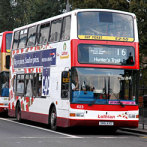Competitors at a world Tae Kwon Do tournament to be held in Quebec City on May 31 will be allowed to wear a hijab, an international federation governing the sport has ruled.
Category Archives: Women
The Islamification of Blackstock Road
 Christopher Hitchens describes his visit to Finsbury Park:
Christopher Hitchens describes his visit to Finsbury Park:
“Returning to the old place after a long absence, I found that it was the scent of Algeria that now predominated along the main thoroughfare of Blackstock Road. This had had a good effect on the quality of the coffee and the spiciness of the grocery stores. But it felt odd, under the gray skies of London, to see women wearing the veil, and even swathed in the chador or the all-enveloping burka. Many of these Algerians, Bangladeshis, and others are also refugees from conflict in their own country. Indeed, they have often been the losers in battles against Middle Eastern and Asian regimes which they regard as insufficiently Islamic. Quite unlike the Irish and the Cypriots, they bring these far-off quarrels along with them. And they also bring a religion which is not ashamed to speak of conquest and violence.”
Hitch further complains that “Blair’s government has appeased leading Muslim apologists by inviting them to join ‘commissions’ to investigate the 7/7 attacks, and thus awarding them credibility well beyond their deserts. A preposterous and sinister individual named Inayat Bunglawala, assistant secretary general of the Muslim Council of Britain and a man with a public record of support for Osama bin Laden, was made a convener of Blair’s task force on extremism despite his stated belief that the BBC and the rest of the media are ‘Zionist controlled’.”
See also the accompanying interview with Hitchens.
Danes battle the veil
Jakob Illeborg examines the case of Asmaa Abdol-Hamid, who has been denounced by right-wing Danish politicians for stating that she will continue to wear the headscarf if elected to parliament.
Despotic secularism
“I am now more convinced than ever that there is no secularism, per se, ever associated with democracy, openness, tolerance and other lofty political values, and no religion, per se, ever linked to intolerance, irrationality, violence, fanaticism and all that is deficient and disturbing. Neither has a monopoly over virtue or evil. Secularism may be allied to repression and despotism; religion to democratisation and openness. In Turkey today, the generals, secularism’s self-appointed ‘absolute guardians’, are the ones threatening to suspend the democratic process and overthrow the elected government and the Islamist-rooted AKP government the one defending democracy and pluralism, and appealing to the nation to uphold them.”
Soumaya Ghannoushi at Comment is Free, 7 May 2007
See also Lenin’s Tomb, 2 May 2007 and Austrolabe, 5 May 2007
Meanwhile, Yasmin Alibhai-Brown takes a different view of despotic secularism: “Our universities do nothing as Muslim women are compelled or pulled into wearing head and body covers. We do not defend our secular state. They do in Turkey, though some with unwarranted viciousness, which is self-defeating. I hope they can save their country’s political pillars being lent on with such strength by Islamicists. They still have a chance and can avoid, I hope, the charms of the Iranian Islamic idyll. We must, too.”
‘At last the veil banned in class’ – Express celebrates
 “Muslim veils can be outlawed from school classrooms, head teachers were told last night. The Government’s legal chief confirmed that the full-face niqab can be justifiably ruled out on the grounds of school uniform policy.
“Muslim veils can be outlawed from school classrooms, head teachers were told last night. The Government’s legal chief confirmed that the full-face niqab can be justifiably ruled out on the grounds of school uniform policy.
“Lord Falconer, a Cabinet minister, said that this also included other Islamic religious garments such as the full-length jilbab gown. He claimed that common sense rather than concerns about human rights should govern what pupils wear to school.”
A leader in the Express applauds Lord Falconer’s position:
“This is a very welcome development. For, while wearing the veil is a matter of personal choice – and accepted in our country which is famed for its tolerance – there are times when it is obvious that this Muslim symbol clashes with the British way. Sometimes it as simple as being able to see the faces of our fellow citizens as we go about our daily business. The school classroom is one such area, the courtroom is another.
“There are times when members of the Muslim community go too far and the Daily Express is not afraid to say so. The setting up of Islamic courts applying Sharia law is one such example.
“The Lord Chancellor has now made it possible for schools to say ‘No’ to the veil. Head teachers have been told that common sense does not conflict with human rights. In other words, they have been given the green light to just say ‘No’ when the occasion demands it.”
Danish government backs veil ban
A majority of parliament is ready if necessary to ban face-covering Muslim niqab veils after a family care worker refused to remove hers on the job. Politicians at parliament are prepared to give employers the right to ban Muslim niqab and burka veils for employees as a result of yet another incident involving the culture clash between conservative Islam and the West.
Odense municipality requested that the Ministry of Consumer and Family Affairs rule on a case where a Muslim woman refused to remove her veil for her job as a family care worker. Odense indicated it was not certain whether it had the authority to reject the woman as a legitimate caretaker on the grounds of her veil under the existing provisions.
Politicians had already been in an uproar over an incident last week where a Muslim parliamentary candidate indicated she would continue to wear her headscarf if she were elected. The niqab covers all of the wearer’s face except the eyes.
Carina Christensen, the Conservative family affairs minister, indicated she would not get involved in the case, which angered many parliamentary members. Conservative leader Bendt Bendtsen made it clear that his party would not accept family care employees hiding their faces from their charges. “We say no to burkas and veils in family care. Care workers are role models and accordingly must promote a proper image of women,” Bendtsen told Jyllands-Posten newspaper.
Bendtsen has the backing of the prime minister, Anders Fogh Rasmussen, who believes public institutions should be able to determine the dress of their employees. “The burka does not belong in family day care nor in public care institutions,” Rasmussen told Politiken newspaper. “We will naturally ensure that there are provisions in the law that allows Odense municipality to forbid the veil.” “I personally believe it’s quite fair that children should be able to see who is caring for them,” said the prime minister.
The far-left Red-Green Alliance also understood the need to have strict regulations in the matter, but did not commit to supporting any change in the law. “This is neither about special treatment or religion. It is a well-founded desire to stress that it is important in family care situations to see the caretaker’s facial expressions,” said Jørgen Arbo-Baehr, the party’s integration spokesperson.
Anger at bus firm’s veil ruling – T&G threatens strike action
 A bus company in Edinburgh has sparked anger over rules requiring drivers to ask Muslim women wearing the veil to show their faces. Religious groups and unions said the rules introduced by Lothian Buses to catch potential fare cheats were unnecessary. Passengers have been told to lift their veils or produce a passport or driving licence when boarding. The company said the rules brought them into line with airport security.
A bus company in Edinburgh has sparked anger over rules requiring drivers to ask Muslim women wearing the veil to show their faces. Religious groups and unions said the rules introduced by Lothian Buses to catch potential fare cheats were unnecessary. Passengers have been told to lift their veils or produce a passport or driving licence when boarding. The company said the rules brought them into line with airport security.
Sohaib Saeed, events co-ordinator at Edinburgh Central Mosque, said: “This seems quite unnecessary. You have to wonder how much of a problem this really is. People going to all the trouble of wearing a veil just to dodge a bus fare seems an incredible effort. This rule is intrusive and it’s singling people out.”
Osama Saeed, from the Muslim Association of Britain in Scotland, said: “In the current climate, I don’t think there are many women in Edinburgh wearing a veil, let alone getting on buses to evade fares.”
The Transport and General Workers’ Union (T&G) said bus drivers could go on strike unless the new rules were ditched. “Drivers are unhappy and uneasy about this. There’s a real risk of causing offence and their jobs are hard enough,” regional industrial organiser Sandy Smart said. “It’s not particularly clever, it’s a bad idea and Lothian Buses need to have a rethink.”
Swedish bus driver sacked after Muslim veil incident
A Malmö bus driver has been fired from his job following revelations that he stopped a woman from boarding his bus because she was wearing a niqab, a form of Islamic headdress that covers the face. The bus company, Arriva, has elected not to extend the driver’s contract, suggesting that this was not an isolated incident.
The incident occurred last Tuesday morning when “Leonora” boarded the number 35 bus on her usual route between the Rosengård housing estate and the city’s central station. According to Leonora, the driver stopped her from boarding, saying that her niqab made her hard to identify. “I have never before needed to identify myself on a public bus. This wasn’t a weapon I was carrying,” she told The Local.
Leonora stayed on the bus anyway, but claims that the driver mocked her and looked at her angrily. “I can understand that people don’t like it, but I think they should leave their prejudices at home,” she said.
Johann Hari: How multiculturalism is betraying women
“Do you believe in the rights of women, or do you believe in multiculturalism? A series of verdicts in the German courts in the past month, have shown with hot, hard logic that you can’t back both. You have to choose.”
Johann Hari gets hold of the wrong end of the stick in the Independent, 30 April 2007
For an alternative view see here.
Hijab to remain banned from tae kwon do
The Muslim hijab will remain banned from tae kwon do tournaments in Quebec despite an offer of compromise in the guise of a sporty, head-hugging head scarf used in international competitions, provincial officials ruled yesterday.
